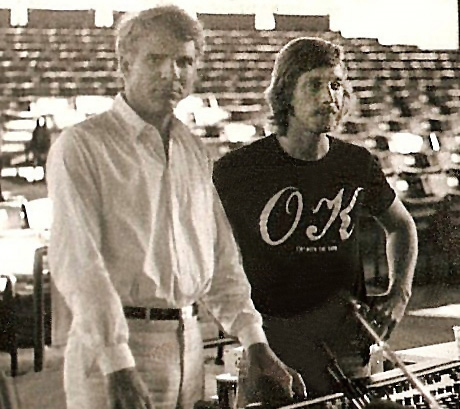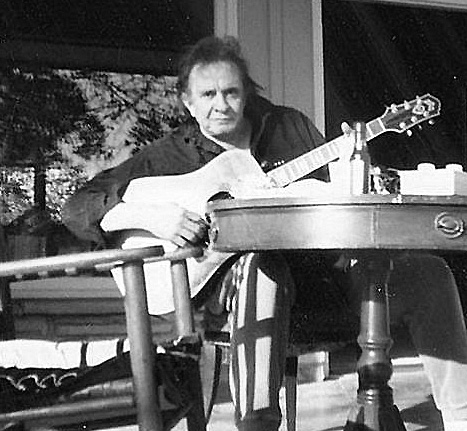
Roots & Branches
While the radio business took on a life of it’s own and has been a mainstay for Carttar, he still did live shows and continued on with Cash until he retired.
“John and June (Cash’s wife) really didn’t know me very well in the early days,” Carttar says. But that would change towards the end of Cash’s career, when the artist spent more time in Branson, appearing often at the Wayne Newton Theater. During that time, Carttar and his wife, Char, who worked as June’s assistant, came to know the Cash family better.
He chuckles while recalling Char’s “hair-raising Rolls Royce rides” through Missouri and Arkansas during June’s regular shopping and antiquing junkets and their opportunity to see the “regular folks” side of the iconic country duo.

“Watching him write and work was a fascinating thing,” Carttar adds, choking up a bit at the memory, “but when he didn’t have his guitar in hand, he was just John and she was just June. They were warm, wonderful, friendly people.
“And June was magic. She had these almost lavender eyes and if she fixed you in her gaze you felt like this powerful being had picked you up and looked at you from all angles. I had huge amounts of fun with them and envied my guys who spent 18 years on the road with them.”
3rd Street continues to diversify, and in recent years Carttar has also introduced a line of microphone stands and accessories under the name Surefoot, a venture driven by becoming aggravated at the state of lightweight mic stands: “The farther I got into it the more I thought, ‘I’ve got all these stands and I hate them; they’re lightweight, they fall over. I never liked ‘em.’ So I thought, ‘What would I have if I had my wet dream for a mic stand?’”
Like many of his initiatives over time, it’s about finding solutions for things that others didn’t necessarily think to address, to which he replies, laughing, “Well, we try.”
That ethic is part of what prompted his work over the past two years as a consultant for Alcons Audio. Carttar says he was “knocked out” by a demo of the company’s gear in Branson.

“Alcons is a quantum leap in ribbon high-frequency technology,” he explains. “So I got more involved and started getting back into sound systems because I became aware of this company.”
Having turned several artists on to Alcons components, he’s embarking on a plan to open a facility in Nashville to rent Alcons “racks and stacks” to other sound companies, adding “I’m done touring, but we can be a resource to others.”
Additional Pursuits
At this point, one might assume – given the time spent running the company, consulting, continuing to do live sound and taking on side projects like his recent rebuild of a vintage Gamble console – that Carttar wouldn’t have any time left over for other pursuits, but that assumption would be wrong. In addition to his substantial workload, he’s also a volunteer firefighter, and in fact serves as a command staff officer for his local department.
“Let me throw something in here about firefighting,” he says. “The thing I learned on the first fire I worked was that a fire scene is like a gig. The right stuff has to get hooked up. On a gig you’ve got to get power and network it to the gear. At a fire you’ve got to get water and network it to the trucks and get the pumps running. The first time I went on a fire I knew what to do because I’d been a roadie and I found that to be interesting.”
As for why he began serving as a volunteer: “I had a cousin who was on the first airplane that went into the towers on 9/11. He was a retired Air Force colonel, a space-borne intelligence asset.”
After the Soviet Union dissolved, Carttar says his cousin began expressing concern that more time should be spent monitoring emerging terrorist threats and ultimately left the Air Force for a job at British Aerospace. “Ironically and tragically, he was commuting from Boston to Los Angeles twice a month for that job and was on the flight for business. So, after 9/11, fire service was something I felt I needed to do.”
As for how he keeps track of everything he’s got going on, it’s just something he believes has been part of his life since childhood, and something he sees in his daughter – a radio police dispatcher – and his grandchildren, specifically his grandson, Cyrus.
“He’s a bit ADHD [attention deficit/hyperactivity disorder], but when he picks something up he already knows how it works,” Carttar concludes. “He’s got some behavioral issues, but he’s exactly like me when I was a kid. I didn’t have time for this bullshit in school. I had stuff to do. I had my electric trains. I had my radios. Cyrus will be like that. He’ll be awesome.”
